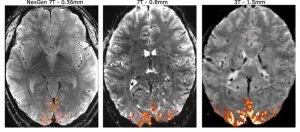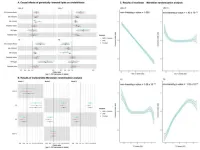(Press-News.org) PITTSBURGH, Nov. 27, 2023 – Common neuropsychiatric symptoms that doctors see in Alzheimer’s disease patients originate from brain inflammation rather than amyloid and tau proteins, report University of Pittsburgh School of Medicine researchers today in JAMA Network Open.
The finding strengthens mounting evidence for the role of neuroinflammation in Alzheimer’s progression and suggests new pathways for the development of therapies targeting neurological symptoms of the disease.
“Neuropsychiatric symptoms such as irritability, agitation, anxiety and depression are among the most difficult symptoms to treat in patients with Alzheimer’s. They are difficult to control, have no clear cause and make it difficult for families to care for their loved one without lots of support,” said first author Cristiano Aguzzoli, M.D., postdoctoral associate at Pitt. “Here, we show for the first time that brain inflammation may be to blame for these symptoms.”
Earlier this year, Pitt scientists discovered that excessive brain inflammation is critical for disease initiation and can predict whether cognitively unimpaired elderly are at a higher risk of developing Alzheimer’s symptoms. Their earlier research hinted at the importance of neuroinflammation in the pathological cascade involving other key players in Alzheimer’s pathology including amyloid beta and tau.
The new findings provide the first strong evidence that brain inflammation is also a direct cause of neuropsychiatric symptoms that often accompany Alzheimer’s-associated dementias.
In the new study, the researchers worked with 109 elderly individuals, the majority of whom had no cognitive impairments. Most of those individuals were, however, positive for amyloid and tau.
By measuring levels of neuroinflammation, amyloid beta and tau via brain imaging and comparing the results with clinical assessments of neuropsychiatric symptom severity, the scientists discovered that microglial activation was strongly associated with a variety of neuropsychiatric symptoms, including disturbed sleep and agitation. While levels of amyloid and tau alone were predictive of neuropsychiatric symptoms, neuroinflammation seemed to have an added effect.
Neuroinflammation was most strongly associated with caregivers or family members reporting their loved one’s rapid mood swings from calm to tears or anger, one of the common symptoms of the disease. Individuals whose caregivers showed higher levels of distress when caring for them had greater levels of brain inflammation.
Taken together, the study adds to the growing evidence of the role of brain inflammation in the early stages of the disease progression, when symptoms like excess irritability tend to emerge. It also suggests that clinical trials targeting neuroinflammation as a preventive therapy for Alzheimer’s could track neuropsychiatric symptoms as one way of measuring the treatment’s effectiveness. Conversely, drugs specifically targeting neuroinflammation could potentially help reduce neuropsychiatric symptom severity and alleviate some of the psychological burden experienced by caregivers, thus improving patient support.
“Since both neuroinflammation and neuropsychological abnormalities are found in several other types of dementia, including Parkinson’s dementia, we are collaborating with scientists around the world to expand these findings to these other diseases,” said senior author Tharick Pascoal, M.D., Ph.D., associate professor of psychiatry and neurology at Pitt.
Other authors of this research include Pâmela Ferreira, Ph.D., Guilherme Povala, Ph.D., João Pedro Ferrari-Souza, B.S., Bruna Bellaver, Ph.D., Carolina Soares, M.Sc., Hussein Zalzale, M.Sc., Firoza Lussier, M.Sc., Francieli Rohden, Ph.D., Sarah Abbas, M.D., Douglas Leffa, Ph.D., Marina Scop Medeiros, M.D., Ann Cohen, Ph.D., Oscar Lopez, M.D., Dana Tudorascu, Ph.D., William Klunk, Ph.D., Victor Villemagne, M.D., and Thomas Karikari, Ph.D., all from Pitt.
END
Nearly a third of the world’s mine tailings are stored within or near protected conservation areas, University of Queensland research has found.
A study led by UQ’s Bora Aska, from the Sustainable Minerals Institute and School of the Environment, said these waste facilities pose an enormous risk to some of earth’s most precious species and landscapes.
“Mine tailings contain the waste and residue that remains after mineral processing, and the storage facilities built to contain it are some of the world’s largest engineered structures,” Ms Aska said.
“We found of the 1,721 disclosed tailings ...
Whether infants at five months of age look mostly at faces or non-social objects such as cars or mobile phones is largely determined by genes. This has now been demonstrated by researchers at Uppsala University and Karolinska Institutet. The findings suggest that there is a biological basis for how infants create their unique visual experiences and which things they learn most about. The study has been published in the scientific journal Nature Human Behaviour.
The way in which we explore our environment with our eyes affects what we notice, think about and learn. The new study analysed preference for faces versus non-social objects in ...
A Perspective article published today in Nature Geoscience tackles the longstanding issue of gender representation in science, focusing on the field of ice core science. Prior work has shown that despite progress toward gender parity over the past fifty years1, women continue to be significantly underrepresented within the discipline of Earth sciences2 and receive disproportionately fewer opportunities for recognition, such as invited talks, awards, and nominations3. This lack of opportunity can have long-term negative impacts on women’s careers. To help address these persistent gender gaps, the study evaluates patterns related to women’s publication in ice core science over the ...
Ahab hunting down Moby Dick. Wile E. Coyote chasing the Road Runner. Learning Latin. Walking over hot coals. Standing in a long line for boba tea or entrance to a small, overpriced clothing retail store. Forking up for luxury nonsense.
What do these activities have in common? They’re all examples of the overvaluation of what economists call “sunk costs”: the price you’ve already irretrievably paid in time, money, effort, suffering or any combination of them for an item, an experience or a sense of self-esteem.
It’s a ...
An intense international effort to improve the resolution of magnetic resonance imaging (MRI) for studying the human brain has culminated in an ultra-high resolution 7 Tesla scanner that records up to 10 times more detail than current 7T scanners and over 50 times more detail than current 3T scanners, the mainstay of most hospitals.
The dramatically improved resolution means that scientists can see functional MRI (fMRI) features 0.4 millimeters across, compared to the 2 or 3 millimeters typical of today's standard 3T fMRIs.
"The NexGen 7T scanner is a new tool that allows us to look at the brain circuitry underlying different diseases of the brain with ...
During the nearly five decades of its operation, the European Molecular Biology Laboratory (EMBL) in Hamburg has developed many fruitful collaborations with other scientific institutions located in the Hamburg metropolitan area. One example is the long-lasting collaboration between researchers at EMBL Hamburg and the Center for Biobased Solutions (CBBS) at the Hamburg University of Technology (TUHH), which has recently yielded new insights into the structure and function of a lipid-degrading enzyme found in a microbe adapted to living in extreme conditions. The findings could help improve ...
The return of bluefin tuna to Northern European waters is a conservation success story, but rising sea temperatures in their Mediterranean nursery grounds mean this recovery may be short-lived, according to new research led by the University of Southampton.
Temperatures expected in the Mediterranean within the next 50 years are expected to drive juvenile tuna out of the Mediterranean, where they may be accidentally caught in existing sardine and anchovy fisheries – requiring fishery managers to adapt their methods to allow tuna nurseries to establish.
Outlining the research, published in Nature, lead author Clive Trueman, Professor of Geochemical Ecology ...
A new study published in the journal Gut has shed light on the complex relationship between serum lipids, lipid-modifying targets, and cholelithiasis, a common condition characterized by the formation of gallstones. The study, led by researchers at the First Hospital of Jilin University, employed a combination of observational and Mendelian randomization (MR) approaches to comprehensively assess these associations.
Cholelithiasis is a prevalent hepatobiliary disorder that primarily affects Western populations. It is a significant risk factor for cholangiocarcinoma, ...
With images - the visual assets can be downloaded by clicking on this WeTransfer link:https://we.tl/t-mbRtSW5BzO
*See further information at end of release for captions and required pic credits
A Leeds researcher is keen to help beekeepers shape their practices following his study which appears to disprove the widespread belief that honeybees naturally insulate their colonies against the cold. His findings suggest that the creatures are potentially being subjected to thermally-induced ...
A large amount of the heavy automobile pollution from Copenhagen’s Bispeengbuen thoroughfare goes straight into people's homes. This, according to a study by researchers at the University of Copenhagen. A sensor developed by one of the researchers can help fill in the blanks of our understanding about local air pollution.
Air pollution cuts the lives of more than four thousand Danes short every year. Locally, we have a very limited understanding how many harmful substances waft in the air we breath. Indeed, air pollution is only monitored at fourteen locations across Denmark.
This ...









